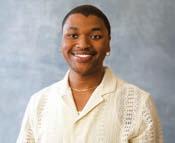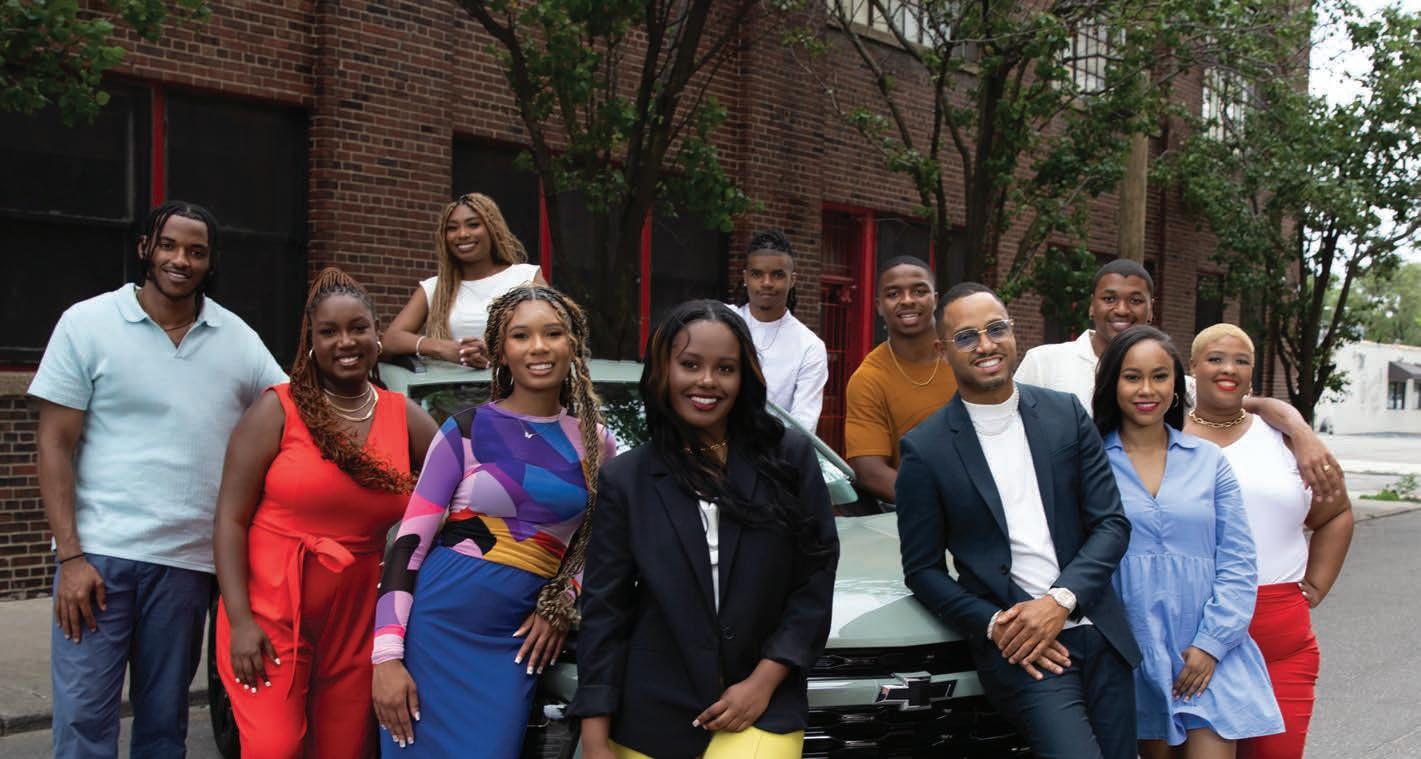






BY DONNELL SUGGS
AUGUSTA - United States Vice President Kamala Harris visited Augusta on Wednesday, Oct. 2. This particular visit wasn't for a campaign event or for a rally like the one her campaign put on in Cobb County last month.
This trip, which included a visit to North Carolina that week, was to get an on-the-ground look at the damage that Hurricane Helene has done.
Depending on where you are in the state, the level of damage and death can vary. A reported 25 deaths have been reported in Georgia and nearly 60 deaths have been reported throughout North Carolina. Harris visited Augusta which was also hit hard during the tropical storm.
At the Parker’s Kitchen on Tobacco Rd., a half-mile from the Augusta Airport, customers had to pay with cash only and could only enter the store four-five at a time due to a lack of associates available to work. Customers were allowed just one case of water per visit.
The Waffle House on Mike Padgett Hwy. offered customers a limited menu of only sandwiches on wheat bread due to the lack of daily deliveries. “People are scared right now,” said Annie, a waitress at that Waffle House location. “Things have gotten better, but it was pretty scary.”
United States Senator Jon Ossoff (D-Ga.) joined the Vice President on her trip. Ossoff visited Valdosta, another Georgia city that saw devastation and the loss of homes and businesses due to Helene.
Harris was greeted by Ossoff and Augusta Mayor Garnett Johnson upon her arrival. The first stop on the tour of the city was to the Utilities Administration Building in downtown Augusta. A nondescript brick building that looks like it belongs on a college campus, it is home to the city utility services and is now a command center for Helene relief.
Harris took a moment to thank the local administration, law enforcement, which included the fire department and the Richmond County Marshal. There was National Guard leadership at the table as well.
“I am here in Augusta to thank everyone who has done extraordinary work,” Harris said prior to the briefing. “These are very difficult times.”
Harris made a point to shake hands and personally greet everyone at the table before the closed-door meeting began.
The second stop on her visit was to the Tara Heights neighborhood where trees could be seen resting on top of homes and power lines were in the streets. Harris greeted a family of five, hugging and comforting the mother in the process. She spent several moments with the family before making her way over to address the media. Harris announced that
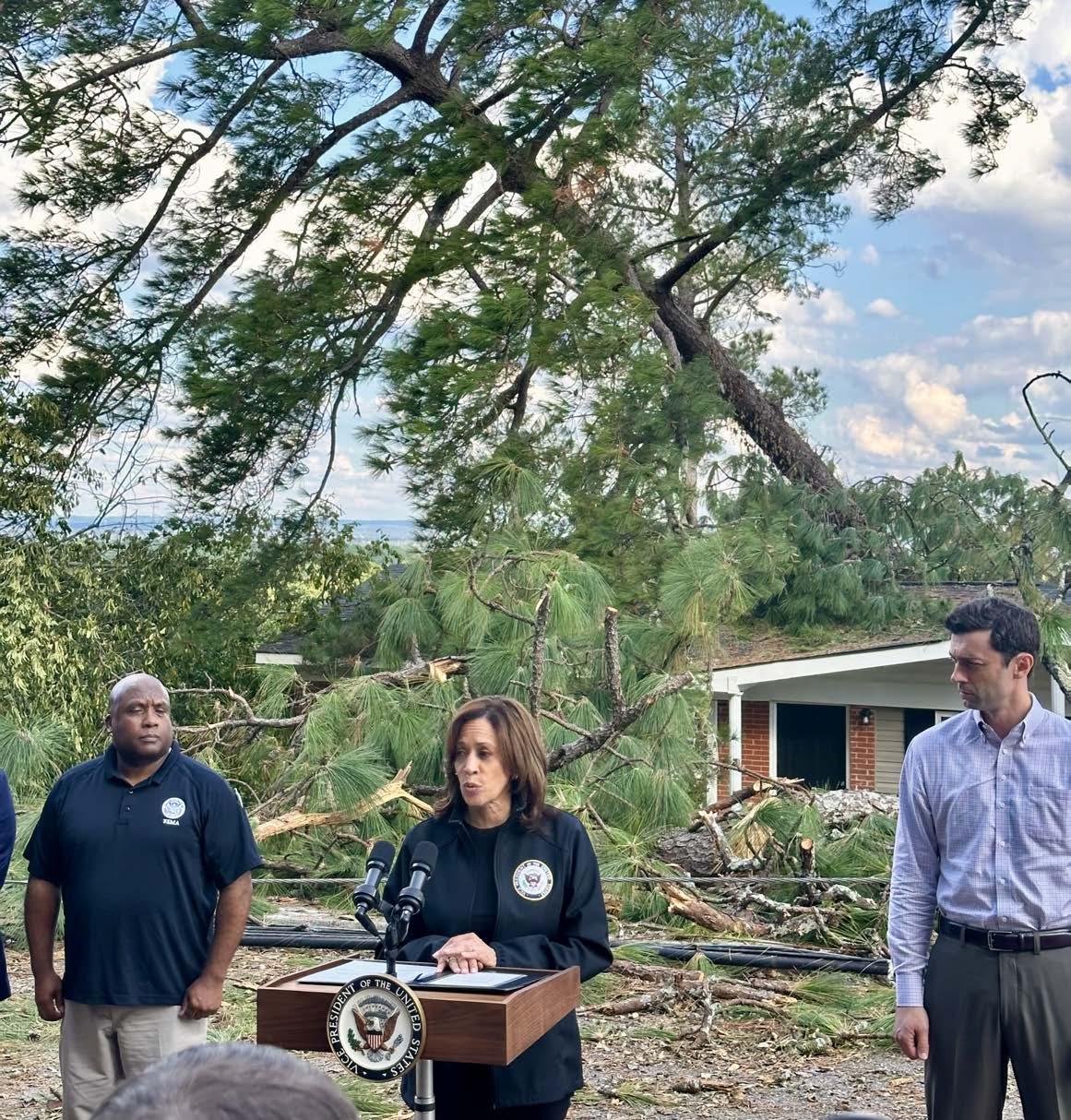
2,
United States President Joe Biden approved Georgia Governor Brian Kemp’s request for 100% approval of all local costs connected to the storm.
“It will have a huge impact on our ability to get relief to people,” Harris said.
That 100% approval of local costs will help with debris removal and emergency services that are provided by the city and state.
“We are here for the long haul,” Harris said. “There’s a lot of work that’s going to happen in the matter of days, weeks, and months.”
Moments later Harris, Ossoff, Mayor Johnson, and others were passing out prepared meals, bottles of water, and fruit cups to local volunteers and members of the community at the Henry H. Brigham Senior Center. In between taking selfies with people and exchanging small talk with the volunteers that were helping pass out the meals, Harris smiled. She was among well-wishers and registered voters. She was also speaking to children that were there with their families.
A family of four was walking away after hav-
ing met Harris and gotten their meals. The mother, looking down at one of her children, could be heard saying, “You guys got a chance to meet the future president.”
Harris left Augusta for North Carolina having gotten to see what Helene did to Augusta, but more importantly having had an opportunity to see the people Hurricane Helene affected. There are 154, 063 registered voters in Richmond County where Augusta is the largest city. Early voting begins in Georgia on Oct. 15.
BY DONNELL SUGGS
Former Georgetown University, Atlanta Hawks, Denver Nuggets legend and Naismith Basketball Hall of Famer Dikembe Mutombo lost a prolonged battle with brain cancer on Monday, Sept. 30. Mutumbo, a native of the Democratic Republic of the Congo, was 58 years old.
The revelation of Mutombo’s cancer diagnosis became public when his family announced it in 2022. Mutumbo spent four and a half seasons with the Atlanta Hawks before being traded to the Philadelphia 76ers during the All-Star break of the 20001 season. Following his retirement from the National Basketball Association after 18 seasons, Mutombo, whose signature finger wag was almost as popular as he was, became an ambassador for the league.
The 8-time NBA All-Star won the league’s defensive player of the year award four times and made his only NBA Finals appearance in 2001 with the 76ers against the late Kobe Bryant, Shaqueille O’Neal and the Los Angeles Lakers. During that 23-game postseason run alongside teammate Allen Iverson, Mutombo averaged just under 14 points, just under 14 rebounds, and three blocks per game. In the five finals games Mutombo played even bigger, averaging 16.8 points, 12.2 rebounds, and two blocks per game.
The City of Atlanta put out a statement on behalf of Atlanta Mayor Andre Dickens regarding Mutombo’s passing. “Like many across the globe, my heart is heavy with the loss of Atlanta Hawks legend and humanitarian Dikembe Mutumbo. I am grateful for the opportunity to visit with him and his wife Rose at their home last month and express the gratitude and pride Atlantans and millions worldwide held for such a truly good man. He is not just a Hall of Famerhe is irreplaceable. My prayers are with his family and loved ones.”
“When you actually hear about it’s still kind of a gut-punch,” Steve Holman, the radio broadcaster for the Hawks the past 39 seasons and a long-time friend of Mutombo, told The Atlanta Voice Holman said Mutombo was larger than life on and off the court and a great humanitarian.
He was one of my all-time favorite Hawks. “He was a great ambassador for the NBA.”
National Basketball Association Commissioner Adam Silver said of Mutombo in a statement: “He was one of the greatest shot blockers and defensive players in the history of the NBA. Off the floor, he poured his heart and soul into helping others.”
Bob Rathbun, the Hawks TV play-byplay announcer and friend of Mutombo told The Atlanta Voice this about
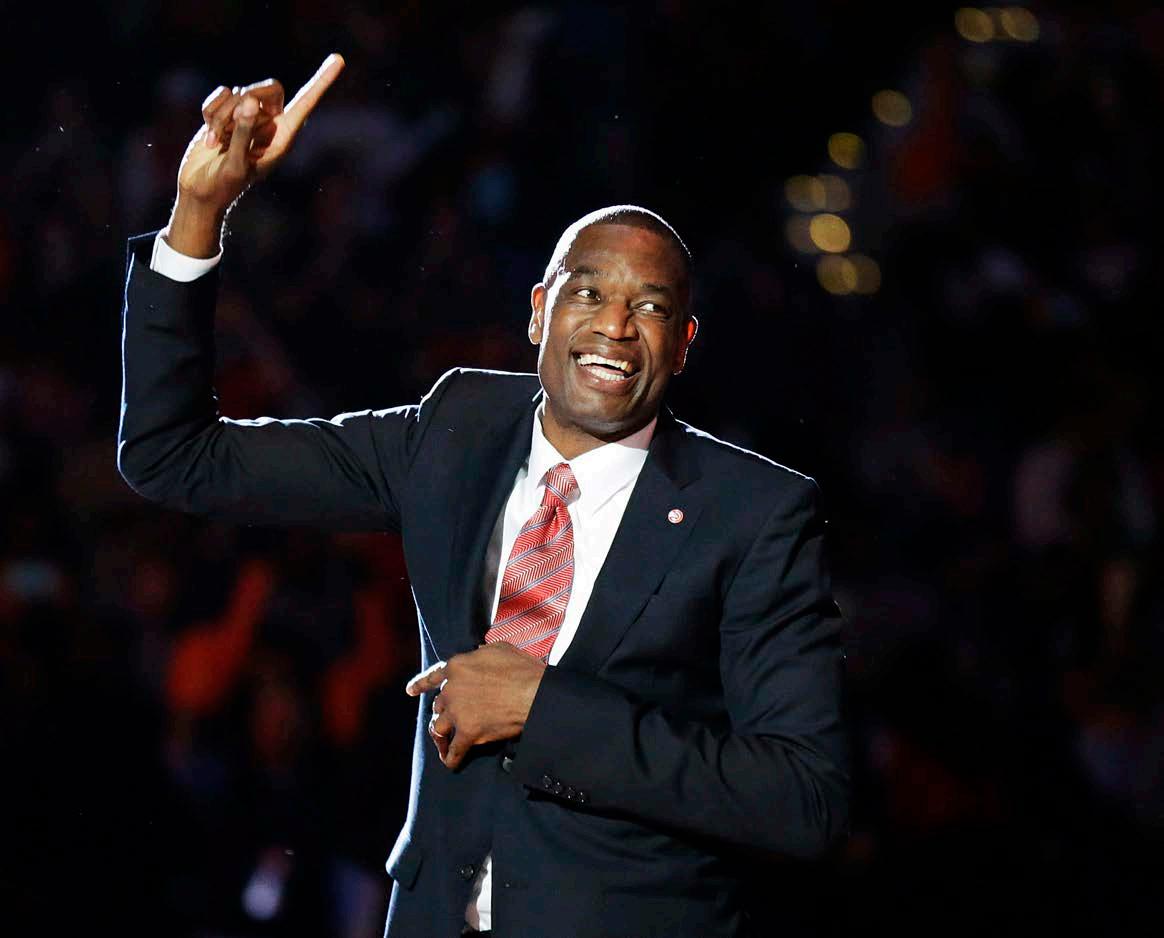
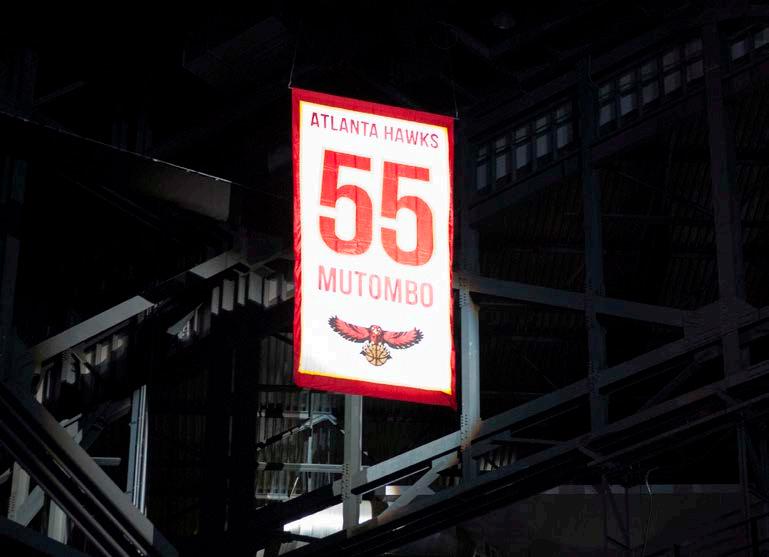
Motombo’s passing:
“It’s hard to put into words what Dikembe meant to Atlanta and to the world. Far beyond his greatness on the basketball court, he was committed to helping people. When his war-torn country kept his dying Mom from getting the medical attention she needed, Dikembe raised the money and built a hospital in The Congo. His work as an NBA ambassador bridged political divides as he spread warmth and good cheer around the globe. His friendship meant the world to me. There will never be another Dikembe Mutombo.”
Former Georgetown guard Gene Smith called Mutombo "a great human being" and added, "He was always polite and respectful of those Hoyas that came before him.
The Hawks put out a statement on behalf of the team’s Principal Owner Tony Ressler: “We are deeply saddened by the news of Dikembe Mutombo’s passing. Dikembe was a proud and honorable man, who lived up to the definition of a word that became synonymous with his name – humanitarian.
“You have to be able to accept failure to get better.” — LeBron James
BY PARISA FITZ-HENLEY
“Katrina.” A word I’ve hesitated to say aloud because of its weight, it’s gravity. A word that’s been quietly repeating in my mind. Not a name anymore. A symbol. People standing on rooftops, frantically waving at helicopters, begging for power for medical devices, for water, for food. Begging to be seen. It’s become synonymous with neglect of the most vulnerable people, neglect of places with poor infrastructure and few resources. Now, after Hurricane Helene, I’m seeing that kind of neglect play out in real time.
Right now I’m in rural upstate South Carolina, a half hour from western North Carolina. Our power is out, water is scarce. Fridges are quickly emptying of salvageable food. We keep checking on loved ones and strangers, sharing information, and managing fear and frustration as oxygen tanks dwindle and gas tanks empty. We are anxious for news of our North Carolina neighbors and social media is the only lifeline — when cell service or Wi-Fi permit. Texts ping urgently: “My parents are sick,” “My mom just had surgery,” “A woman is in labor,” “My son and his family are missing.”
Across the state line in western North Carolina, cell towers are down, and first responders struggle to navigate roads that have crumbled. People need help. But we don’t know what kind — or how to get to them.
The reality of living here goes beyond the storm. I’m in a “possible” sundown town according to research by Tougaloo College. Everyone Black in surrounding towns knows this. Multiple times when I’ve told Black folks where my parents live they responded with wide eyes and a hushed “I don’t go there.” My white mom and step-dad decided to retire here before Obama was elected. Before the Confederate flag came down at the South Carolina state capitol and before politics became so openly divisive.
But now, those symbols are hard to miss. Flags fly on porches. Opinions are loud and clear. I lived here during the height of the pandemic, from 2020 and 2021. It was a terrify-

ing time for so many, but for Black folks especially so. It was a time when South Carolina Senator Lindsey Graham said “If you’re a young African American, an immigrant, you can go anywhere in this state. You just need to be conservative, not liberal.” I’m half-Black. I wore a mask and lived in constant fear
And though my faith as a Bahá’í teaches me to see the good in others, to unite people, to rely on God, I slept with a gun by my bed. I hid when a white stranger visited my landlords. Then I had a realization: I could either (safely) be about what I say I am, or continue to live in fear. I took a walk in the center of town, past the Confederate monument and flag flying, and prayed.
I’ve since moved to a semi-rural area that’s slightly more diverse. I’m reminded of what I felt growing up in Florida and living in the Northeast and California: that our nation’s issues with race would be healed first in the South.
The South is a place of deep wounds, visible and invisible, for all. I firmly believe no one, not the richest “master,” not the most seemingly innocent bystander, came through hundreds of years of enslavement and Jim Crow unscathed. “Seeing White,” a podcast from Scene on Radio, and “Hillbilly,” a documentary by Sally Rubin
and Ashley York, tell the story of a region where Black, white, and Indigenous folks are pitted against one another to protect the wealth of a few.
The same playbook that dehumanized Black people as subhuman, unintelligent, bumbling, criminal, drug-addled, and responsible for our own oppression has been, and is, successfully used to caricature the white working class of Appalachia and the South in general, branding them “hillbillies,” “rednecks,” and “white trash.” It’s the reason the land and bodies here have been poisoned by coal mining, pollution, and prescription drugs, enriching only a few.
It’s why even now there are people who have implied this region deserves what it’s getting, not realizing that, aside from it being filled with human beings, there are folks who look and vote just like them who’ve drowned in their homes.
This isn’t about “both sides.” It’s about the illusion of sides altogether.
That brings me back to Katrina. And Helene. There are people we are in the habit of valuing, and people we are not. There are people we think are worth headlines and urgency and aid, and people we don’t. And what these people have in common is they are mostly with-
out wealth, mostly neglected by our government, and mostly told the “other side” hates them, that they are on their own.
As I sit here, batteries dwindling, using scant solar power to fast forward through DVR’d national news coverage inundating us with the same political fights and gaffs and scandals from a dozen polished angles, I see little to no mention of the stacked or floating bodies, the people begging for help, the endless texts and posts pleading for someone to see. I see little to no mention of the words “catastrophic,” “biblical,” or “apocalyptic.” I see little to no mention of Katrina. But I know that I will.
As the word gets out, when the news media prioritizes the nightmare in western North Carolina, the grief will spread. And so will the shame. And so will the blaming of the victims of this disaster, for being poor, for being unprepared, for not being smart enough to get through it alive.
This is happening hundreds of miles from a coast, at high elevations, in an alarmingly warming world. It can happen to anyone. And if we don’t start questioning why we think certain people deserve safety and others don’t, more and more of us will drown — taking this nation with us.
FOUNDED May 11, 1966 FOUNDER/EDITOR
Ed Clayton Immortalis Memoria
PUBLISHER/EDITOR
J. Lowell Ware Immortalis Memoria
The Atlanta Voice honors the life of J. Lowell Ware.
PUBLISHER
Janis Ware
PRESIDENT/
GENERAL MANAGER
James A. Washington 2018-2024
EXECUTIVE ASSISTANT TO PUBLISHER
Chia Suggs csuggs@theatlantavoice.com
EDITOR IN CHIEF Donnell Suggs editor@theatlantavoice.com
GENERAL ASSIGNMENT REPORTERS
Isaiah Singleton isingleton@theatlantavoice.com
Laura Nwogu lnwogu@theatlantavoice.com
EDITOR AT LARGE
Stan Washington swashington@theatlantavoice.com
MANAGING EDITOR, DIGITAL Itoro Umontuen iumontuen@theatlantavoice.com
ADVERTISING, SALES & CIRCULATION
ADVERTISING ADMINISTRATOR
Chia Suggs advertising@theatlantavoice.com
CIRCULATION MANAGER
Terry Milliner
SALES
R.D.W. Jackson rdwadman@gmail.com
SUBMISSIONS editor@theatlantavoice.com
DIRECTOR OF PUBLIC RELATIONS
Martel Sharpe msharpe@theatlantavoice.com
CONTACT INFORMATION 633 Pryor Street, S.W. Atlanta, GA 30312 Office: 404-524-6426 info@theatlantavoice.com


BY JAMES A. WASHINGTON
The Atlanta Voice
Iwas thinking about the EX factor the other day and realized just how biblical a change is to go from current to EX. I am constantly saying that God puts people, things, and situations in your way while you’re on your way, and they are not supposed to arrive with you when you get to your destination. You cannot get where you’re going unless those people, things, and situations were not put there in the first place. This is so fundamental that Christ could not have saved mankind if He didn’t go through the “stuff’ that was put in His way on His way to the cross. To me, this is what I call a factoid. That means you cannot get to where God has destined you to be unless you have some “Exes” in your life. Some of y’all know exactly what I’m talking about, but you don’t want to acknowledge that your EX is not yet just that, an EX. Now, for those of you who feel me because you’re now on the other side, let’s talk about the value of ex-husband, ex-wife, ex-job, ex-house, ex-city, and for you Christians; we can include the ultimate Ex. You. We are
You cannot get to where God has destined you to be unless you have some “Exes” in your life
all EX something: ex-addicts, ex-alcoholics, ex-liars, ex-convicts, ex-gamblers, and sinners. Some of us put the EX in EX, and rightfully so. I earned mine. I don’t know about you.
My point is this. Without the EX, you, we, I don’t have a testimony. And without the testimony, really, where would you be today? Without Christ’s Road to the cross, the stuff put in His way, where would we be? Our lives sometimes represent one challenge after another, and we are who we are because God brought us through it. And when we look back on it, we can thank God for Exes. Those people, places, and things are no longer in our lives, but they are a part of us. They will be forever. And because of it, let the EX celebration begin. Now you know some of y’all are so glad that it didn’t go how you wanted it to, he or she didn’t stay, you lost the job, and the
“YOUR VOICE”
so-called friends don’t come around anymore. Celebrate your Exes, please. But understand that God puts people, things, and situations in your way while you’re on your way, and they are not supposed to arrive with you when you get to your destination. However, I’m talking about the destination God has chosen for you. Let me be clear about this. It’s a God thing with me. That means if I can relax, relate, and release, as they say, and understand there is a divine purpose in all that is put in my way, my job is to look for it, embrace it, and pray about it. And when I realize it’s not going to get me where I’m supposed to be, then my job is to put an EX on it. That may be hard for some of us because we want to make it work. God wants us to put an EX on it because the only reason it’s, he or she, is in your way in the first place is because you decid-
ed to make it a part of your journey, not God. We’ve forced His hand by making God make you see the value of the EX. Now I know I’m preaching to somebody, which is not my intent. But, if you are not in an environment that uplifts you, brings out the good in you, blesses you, and allows you to be a blessing to others, it’s EX time. It’s time you become what God has made you become and not what this world, these people, these situations, your addictions, and life’s mistakes say you are. I’m just saying there’s reason to have and, at times, be an EX. And when you realize this, the road to God’s house is clear. See you when you get there.
May God bless and keep you and all your EXES forever.
This column is from James Washington’s Spiritually Speaking: Reflections for and from a New Christian. You can purchase this enlightening book on Amazon and start your journey toward spiritual enlightenment.

Eric Adams, Marcellus Williams, Mark Robinson, Sean Combs. What are your impressions on the recent exposures of the tragedies of Black Men in America?
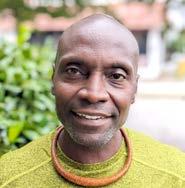
Stone Mountain
"My thoughts about the call out on the prosecution of the black men in the last few weeks is a direct reflection of what's been going on in our history in that treatment of the black man compared to the same offenses that a white counterpart may do. We will never be able to get the same treatment in the justice system."

Gwinnett
"I think this is an excuse for something to be hidden. All these men being revealed is just a distraction from something more important for us to focus on. We all need something to focus on, but we get distracted by social media and anything, which makes us continue to scroll. So it's a distraction. It's a distraction from laws that are changing. It's a distraction from the changes in politics. It's a distraction from the chemicals they're putting in much of stuff. Honestly, it is just so that they can keep us scrolling. They get paid for us to continue scrolling on these apps."
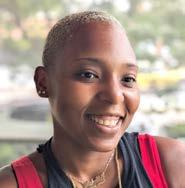
MICHELLE
Atlanta, owner of Double Dutch Aerobics
"My thoughts about all that's happening in the media with black men now is honestly, I feel like it's not only black men, it's black people. But I feel like it's literally because any time, as black people, we start to be aware or we start to rise financially or get any power, they just make sure to bring it back on down. I think that we're learning our power. Diddy, last year, at Invest Fest, was talking about what he was doing financially and calling out things that happened, just like Jay-Z's song Still Nigga. Some things still happen even when you're at the top. Sometimes, people think money erases race, and they're just reminding us that it doesn’t, so racial issues are still happening. And I think that's the call out, that money doesn't erase race no matter how much money you get."
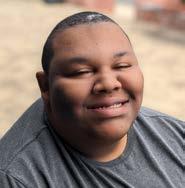
AVERY WOOD Atlanta
"Well, mostly about Marcellus Williams, that was pretty much bad. He did not have a fair trial or anything like that. He had been stuck there for years, and nothing had been done about it. That wasn't good, and then they just executed him a day or so ago. Rest in peace for him. And P-Diddy probably deserved what he got on all levels because he did some pretty bad stuff. Everybody else, I give prayers to you. I feel like [Black men] are being targeted for sure. But then again, we've always been targeted in different kinds of ways. No matter what you do, you'll always be targeted."
Compiled by Vincent Christie
BY LAURA NWOGU
United States representatives and Democratic party representatives hosted a debate watch party on Tuesday night in support of Minnesota Gov. Tim Walz. With the smell of soul food wafting through the restaurant and the anticipation of the debate building, supporters packed themselves into Magic Soul Food in Sandy Springs surrounded by campaign posters supporting the former educator, football coach, and Vice President hopeful.
“When we win, we fight,” the crowd chanted, a sentiment that has carried the election since Vice President Kamala Harris announced she was running for President.
Dontaye Carter, candidate for Sandy Springs mayor, rallied supporters moments before the beginning of the debate.
“I know we’re tired because we’ve been in this [fight] in Georgia for a long go, but I always remember the thing that my mother told me. She said they don't come home without standing up to that bully. Right now we're standing up to some bullies.
“We’re here to rock on our coach, the next VP, Tim Walz.”
Three weeks after former President Donald Trump and Vice President Kamala Harris had their first and only debate in Philadelphia at the National Constitutional Center, Ohio Sen. JD Vance, and Walz took the stage in New York City. It is expected to be the last debate before the November election.
Walz and Vance debated a list of topics including immigration, the economy, the housing affordability crisis, and abortion. The latter topic received applause during Walz’s support of reproductive rights and mentions of Amber Thurmond, a Georgia mother who died after waiting 20 hours for emergency care under the state’s abortion ban.
Smyrna resident Linda Husser said she attended the debate watch party to be a part of history in electing the first woman and person of Black and South Asian descent into the White House.
“I was able to vote for Barack Obama and just the thought that I could vote for her [Kamala Harris] in this lifetime is just unreal,” Husser said.
“I hope that Walz shows that hope is still a virtue that should be applauded and that he will show that love still reigns supreme, integrity still has value and we don't have to be bad people in order to win.”
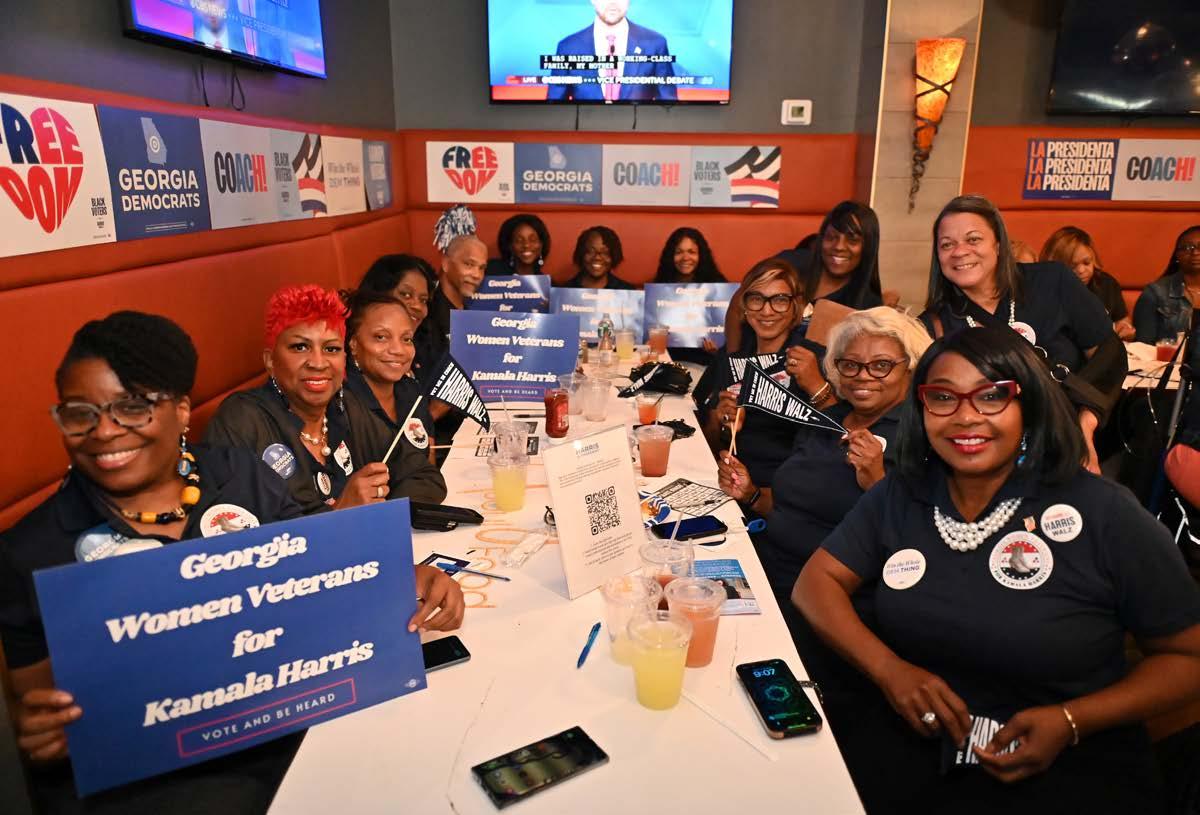
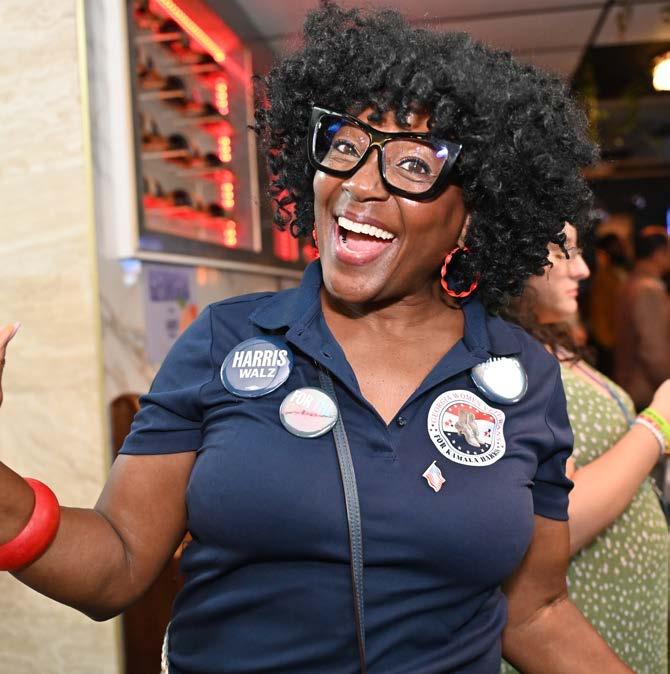
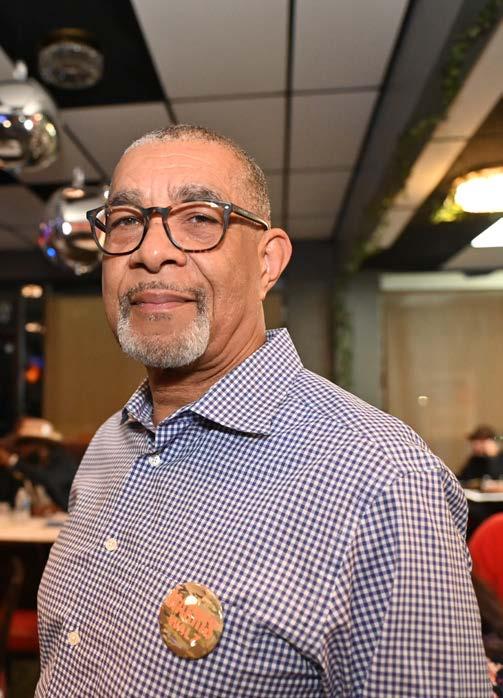
BY JULIA BEVERLY
Just one year ago, music mogul Sean “Diddy” Combs could be seen in Atlanta surrounded by a throng of security guards parting the sea of REVOLT WORLD festival attendees as he shouted “Love! Love!” at fans.
The love is no more. When video of Combs assaulting his former girlfriend Cassie Fine (formerly Ventura) in a hotel hallway surfaced this summer, Combs stepped down as chairman of REVOLT, the media company he launched in 2013.
Now, less than a week after Combs’ arrest on federal racketeering charges, REVOLT WORLD is back, their coffers buoyed by corporate sponsorships from the likes of Pepsi and State Farm. REVOLT WORLD attendees were invited to play games in the Mountain Dew-sponsored gaming center or visit the Wal-Mart “Shout Out” tent.
Perhaps with this rebrand in mind and an election just 34 days away, this year’s REVOLT WORLD programming included several panels with a political bent. Tez on Ten, a REVOLT show hosted by political analyst Tezlyn Figaro, recruited Florida Republican
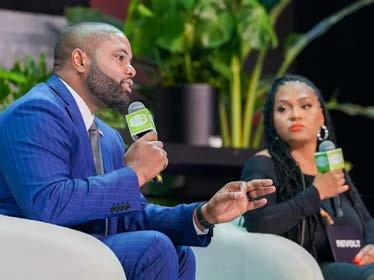
Congressman Byron Donalds and outspoken civil rights activist, Louisiana’s Gary Chambers Jr., to serve as surrogates for the Republican and Democrat platforms, respectively. Donalds has increasingly aimed to position himself as an advocate for former United States President and current Republican presidential nominee Donald Trump in the Black community, an interesting placement in a heated election year where polls indicate

that many Black Americans – traditionally a heavily Democratic voting block – are increasingly considering other options.
The informal debate, moderated by Tezlyn, yielded several heated moments around charter schools, inflation, minimum wage, and police brutality. During one exchange, in which Chambers challenged Donalds on the coronavirus death rate in Florida, Donalds’ response was given an impromptu fact-checking by a curious attendee: none other than journalist Roland Martin. Donalds credited Trump with keeping businesses afloat with PPP loans during the pandemic, and Chambers responded with a civics lesson, explaining that the funds were allocated by the Democratic Congress. According to Chambers, Trump only delayed the process by insisting that the checks be signed with his name.
Both men were firm in articulating their respective points, and pointedly avoided shaking hands or any other polite formalities. The audience – modest numbers on a Sunday morning – largely seemed to respond to Chambers’ Democratic appeal, while a handful of vocal members sided with
Donalds.
Gary Chambers Jr. wrapped things up with an appeal on behalf of Harris and the Democratic ticket: “I can’t list all of the things that Donald Trump did that were detrimental to Black people. But I can tell you that if you go to [Gary Chambers Jr. on social media] there’s a post about fifteen moments and the judges he’s appointed and the impact they have on you.” Chambers told attendees that they don’t need to “fall in love” with Harris, simply analyze her policies and understand that they are designed to benefit the working class, not the wealthy.
He continued: “Talk to your cousins. There’s a false narrative that my good brother [Byron Donalds] tries to carry out there that Black men are going to the other side. Eighty-plus percent of Black men have voted on the right side, protecting their humanity, protecting their pockets, and advancing their communities. Black people cannot put our humanity on the shelf for our pocketbook because they will kill you on the street like a dog and then you’ll call somebody like me to help get you justice. So […] listen to the people who fight for you every day.”
She plans to give:Trump has no plan.
$50K tax deduction for new business owners
$6K to young families in the first year of their child’s life
$25K in down payment assistance for first time home buyers
During his presidency, the Black unemployment rate was at an all time high
His Project 2025 agenda would roll back civil rights policies that offer opportunity for Black Americans He uses race to divide us, scapegoating Black & Brown communities
She believes in what is possible. He’s more interested in defending himself than looking out for you. Let’s turn the page and move forward.
BY DONNELL SUGGS
Apanel on how to better secure a safe, secure, accessible, and transparent election in Georgia took place at the Carter Center on Monday morning. The panel, which included several voting advocacy groups, took place a day before the 100th birthday of former United States President Jimmy Carter, the country’s oldest living former president.
The “Safe, Secure, Accessible, and Transparent Elections in GA.: An Expert View” panel includes representatives from four organizations: The Democracy Defense Project, The Georgia Democracy Resilience Network, the Georgia Democracy Task Force, and the Carter Center.
“I think given the state of information in Georgia now, which is the same thing we are seeing in many places around the country, it’s important for people to hear from leaders from across the political spectrum about issues openly, honestly, and frankly,” said Dr. David Carroll, Ph.D., the director of the Democracy Program at the Carter Center. “There’s a lot of misunderstanding and a lot of disinformation; these are senior political folks who have a lot of experience and history.”
Carroll moderated the panel, which included former Atlanta Mayor Shirley Franklin, the first female mayor in Atlanta’s history. Franklin was there to represent The Democracy Defense Project, a bipartisan group of former elected officials. Former Georgia Governors Roy Barnes and Nathan Deal are also part of this organization but were not in attendance.
“We have come together to add our voices to the conversation about Georgia,” Franklin said. She added that the group is more focused on what is happening in the state instead of nationally.
Former Georgia Senator and current Carter Center Board of Trustee Chair Jason Carter was also on stage alongside Ryan Germany, the Co-Chair of the Georgia Democracy Task Force, and former Georgia Attorney General Sam Arnold, who sat in for Deal.
The Georgia State Election Board was one of the first topics of discussion. It was a question of what certification means to voters and how to better educate voters about what is going on.
Germany said, “We are already in the election from an election administration standpoint. They are very much in it right now.”
Germany added, regarding certification and the necessity of the process,
“It’s been something that has always happened.
Carter pointed out that the late ruling-making changes concern groups like the ones represented during the panel. “It just undermines the public confidence of what’s going on,” he said.
Franklin, who has campaigned for elected office while breaking a proverbial glass ceiling, said the biggest problem in Georgia elections right now is whether or not the Board of Elections can be trusted.
“The Election Board’s actions, whether legal or not, give the impression that they are unfair,” Franklin said. “Some people will believe their vote doesn’t count.”
According to Carter and Germany, the Carter Center and the Georgia Democracy Task Force plan to work as election monitors in Fulton County. The organizations will work as an outside observer with “no stake in the election,” said Carter. “In every single election, there is going to be imperfect, but imperfect doesn’t mean inaccurate.”
“We have put together a team that has a lot of Georgia election experience, and there are so many people now that want to observe the election,” Germany said. “They really want to see who is going to win this election.”
Franklin’s closing remarks focused on making sure the public is fully informed about the election process going forward.
“The key to this is getting the word out,” Franklin said she sees an upswing in election distrust in Georgia and around the country. “I’m optimistic, but I’m also pragmatic. I don’t think this is going away. It’s not just about this election.”
Franklin said gaining and maintaining public trust is at the top of her list of accomplishments during her two terms as Atlanta Mayor. Carter agreed that his grandfather, former United States President Jimmy Carter, would list the same things as what he is proud of during his single term in the White House.
During the public question portion of the panel, the panel discussed the electoral college, what legal avenues are available for voters, the Gen Z voters of Georgia, what the organizations are doing to get the word out, and what could happen if the Election Board refuses to certify the results of the upcoming election.
Franklin called any talk about the need for the electoral college a “distraction” during this election. Carter said the courts must be in play if there is a “rogue election board.” Arnold suggested that social media can be a “gift and a curse” as a way to get the word out about voting to friends and family this election season.
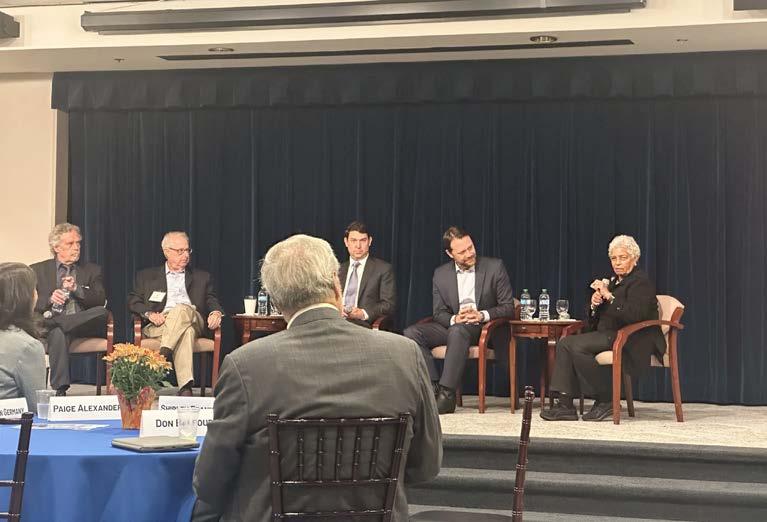
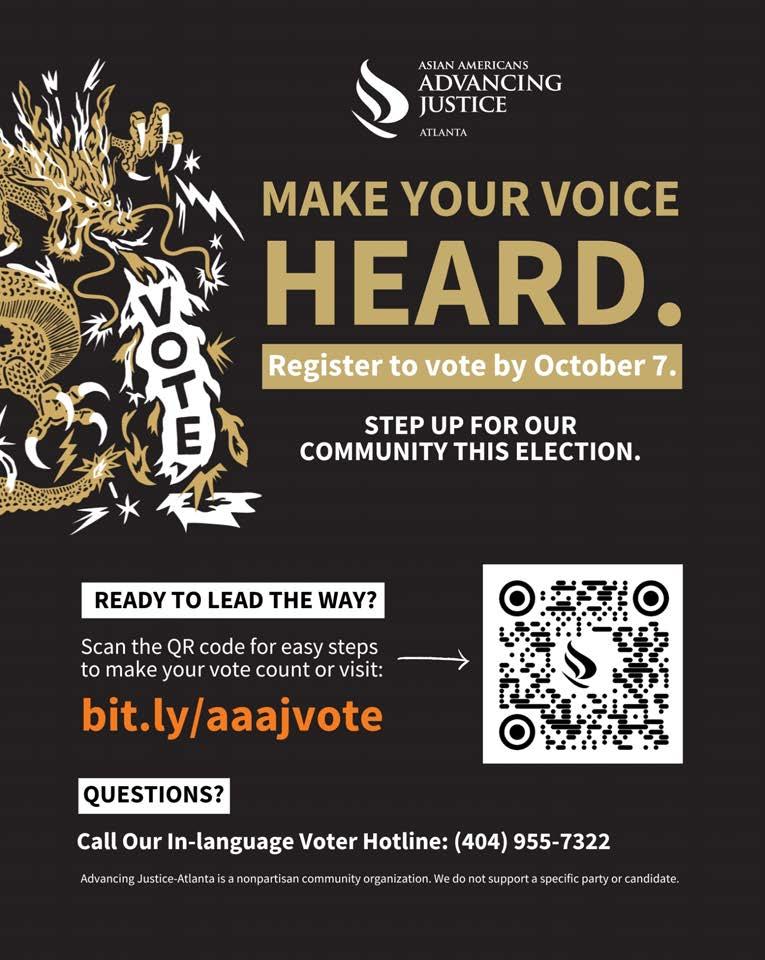
BY ITORO N. UMONTUEN
The aromas of barbecue, the bottles of beverages and football fans dressed in red and black or black and gold made their way toward Mercedes-Benz Stadium for a game between the New Orleans Saints versus the Atlanta Falcons. However, at a nearby tailgate, Congresswoman Nikema Williams, D-Georgia, sought to foster a moment of unity before the game.
“We may be rivals today, but come Novem-
ber 5th, we will be on the same team,” Williams said.
Williams was joined by actor and activist Anthony Anderson as they co-hosted a get out the vote rally before Sunday’s NFL contest.
“We want to keep this a blue state, right,” explains Anderson. “I mean, that’s what we’re here to do. It’s important to get out and make a plan to vote, you know? To make sure that people check their voter registration.”
Each reputable survey says Georgia is a
dead heat heading into October. Vice President Kamala Harris trails former President Donald J. Trump by one or two points in various polls.
Recently, the Georgia State Election Board approved a proposal which mandates poll workers to count paper ballots by hand. According to a recent CBS News poll, four in 10 Trump voters prefer challenges to Georgia’s 2024 results if Harris wins the Peach State.
Anderson doubled down on the idea that
Georgians must double-check their voter registration statuses and vote early.
“Because on October 7, because if they’re not registered to vote, their vote doesn’t count. So, I’m just out here to bring awareness to that. And to make sure that people have a plan. I want to make sure people come out, vote early and vote in person.”
The final day to register to vote in the 2024 Presidential Election in Georgia is Monday, October 7th. Early voting in Georgia begins on October 15.
BY KEITH BOYKIN
Three Black men have dominated the news in recent days for different reasons: Eric Adams, Marcellus Williams, and Mark Robinson. Their stories don’t have much in common, but they reveal much about our country and our politics.
First, Adams, mayor of New York City, was indicted Wednesday on bribery and corruption charges. Three years ago, when I was still living in New York, I refused to vote for him. Even after he was elected, I was still not a fan but gave him four years to prove me wrong. He did not prove me wrong.
Last year, Adams refused to condemn a white man who choked a Black man to death on a subway train. In January, he vetoed a ban on solitary confinement in city jails and killed a plan to document police stops. Just as I expected, Adams brought back the racially biased stop-and-frisk policing that was ruled unconstitutional a decade ago. And in the past few months, his administration has been engulfed in scandals and resignations. Adams is exactly who I thought he would be, and many of us tried to warn New Yorkers. But I remember talking to Black men in Harlem who supported him over a talented Black woman named Maya Wiley, in part because he’s a Black man. For all the lies about Vice President Kamala Harris — that “Kamala is a cop” — Adams actually was a cop, and a former Republican. But many Black men were still willing to support him.
Second is Williams, a 55-year-old Black man from St. Louis, my hometown. The state of Missouri executed him this week after the Supreme Court refused to stop his execution, even though the prosecutor said the case against Williams was flimsy and tainted. The NAACP appropriately called the execution a “lynching.”
A 6-3 Supreme Court decision split along party lines: the six conservatives approved his execution, while the three liberals voted to stop it. Donald Trump appointed three of the six conservatives; therefore, if Hillary Clinton had won in 2016 Williams would more than likely still be alive.
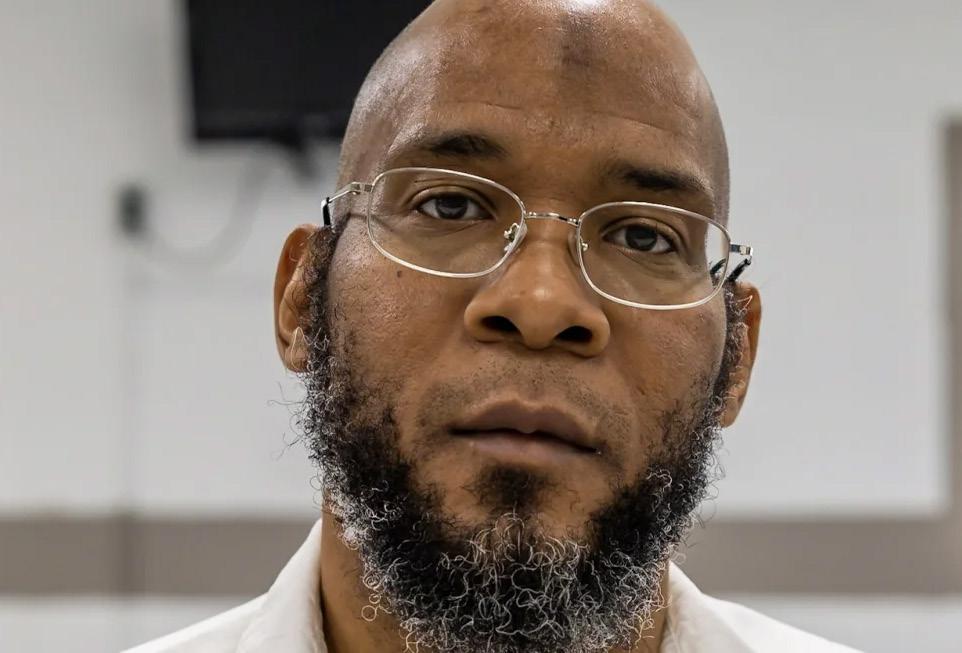
Still, some people on social media tried to blame President Joe Biden and V.P. Harris for Williams’s death. That’s a damn lie. Missouri’s Republican governor, Mike Parson, and Missouri’s Republican Supreme Court approved the execution. It was the Democratic prosecutor in St. Louis County, and the Democratic appointees on the U.S. Supreme Court, who tried to stop it.
No legal authority gives Biden the power to intervene or pardon Williams in a state murder case. So, if you’re going to criticize Democrats, at least understand how our system of government works.
I’ve been a lifelong opponent of the death penalty in all cases, so for anyone who is upset about Williams’s execution, don’t ever tell me it doesn’t matter who wins elections. This is literally life or death. Elections have consequences.
Third, Mark Robinson, North Carolina’s lieutenant governor, has been outed as a self-hating, hypocritically porn-obsessed, Black Nazi who wants to bring back slavery and join the Ku Klux Klan. After all that, Trump and running mate JD Vance refuse to disavow him. This proves the point I’ve made many times that Republicans love Black peo-
ple…who hate Black people.
I get why white people support Robinson, but how the hell can any self-respecting Black person be associated with a party like this?
Just this week, Louisiana Republican Clay Higgins called Haitian Americans “wild,” nasty, “vudu”-loving, pet-eating “thugs” who should get “their ass out of our country.” And even then, Republican House Speaker Mike Johnson refused to condemnhis racist rhetoric.
“Clay Higgins is a dear friend of mine and…a very frank and outspoken person. He’s also a very principled man,” Johnson said.
First of all, Clay Higgins admitted years ago that he voted for Ku Klux Klan leader David Duke for governor of Louisiana, so why is he a dear friend of Johnson?
Second, Johnson claimed that Higgins deleted the post after “he prayed about it.”
Turns out that the “very principled man” only did so only after the Congressional Black Caucusbrought up a resolution to censure him.
“But, you know, we move forward,” said Johnson. “We believe in redemption around here.”
Redemption?
No, sir. There can be no redemption with-
out contrition. So, tell me: when will Trump, Vance, Higgins, and Elon Musk apologize to the Haitian Americans whose lives they’ve endangered in the most overtly racist major-party presidential campaign in 60 years?
These people are not the least bit remorseful about their bigotry unless it blows up in their faces. And just like Robinson, they all had a long history of racist, sexist, and inflammatory rhetoric before these scandals erupted.
And that’s the problem. Too many Americans don’t pay attention to their government until it’s time for a presidential election every four years. But Adams, Williams, and Robinson show what happens when we don’t.
Our ignorance makes us susceptible to the clickbaiters, cynics, opportunists, hoteps, bots, and opps who spread misinformation for clout and pay. I’ve worked in local, state, and federal government, and I know that governing is complicated. The system is designed to make it easy for the powerful to maintain their power but difficult for the powerless to fight back.
So stop listening to the clout-chasing clowns who don’t know anything about government or politics who try to get you not to vote or to throw away your vote. Stop listening to cynics peddling unrealistic expectations of what can happen in a single term in office and then weaponize your disappointment.
The truth is we can’t win if we don’t participate, and we can’t participate effectively if we don’t know the rules.
“Black Vote, Black Power,” a collaboration between Keith Boykin and Word In Black, examines the issues, the candidates, and what’s at stake for Black America in the 2024 presidential election.


The EVECE Foundation invites the community to participate in its annu al Walk Run 5K on Saturday, October 5th, 2024, in honor of mental health awareness and community wellness. The event will bring together individuals from all walks of life to raise awareness for mental health challenges and promote the importance of wellness within our community.
Event Details:
• Date: Saturday, October 5th, 2024
• Time: 7:00 AM Doors Open, 8:30 AM Race Start
• Location: Atlantic Station
• Registration: www.evece.org/walkforlife
The 5K Walk aims to unite the community in a day of exercise, fellowship, and purpose. It will be a moment to remember, celebrate, and honor the lives of Chris and Erin—two bright souls whose legacies continue to inspire us. Their lives, along with countless others lost to depression, substance abuse, suicide, and gun violence, will be commemorated during this event.
Dr. Christopher Edwards, father of Christopher and Erin Edwards and Chair -
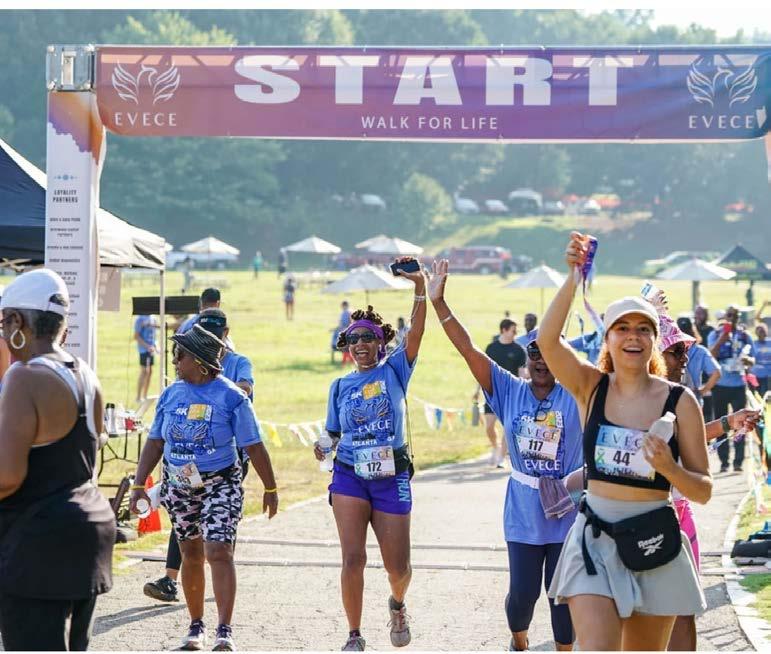
man of The EVECE Foundation, shared his concern about the prevalence of suicides and the 300+ mass shootings in the
country, including the most recent one at Apalachee High School in Muscogee County, Georgia. Dr. Edwards stated, “At
some point, we all have to realize that all of this stews in and rises from abnormal mental health! However, there is hope, it is not too late, but we have to start doing something about this now.”
“We believe that raising awareness for mental health is a step toward breaking down stigmas and creating a society that values emotional well-being,” said Edrea Edwards, Executive Director of EVECE Foundation. “Our vision is to foster a community prioritizing mental health through education, health care access, community support, and positive societal attitudes.”
All are encouraged to participate in this impactful event as individual walkers, team participants, or volunteers. This free community event will immediately follow the race. Join us for vendors, food trucks, engaging with a mental health specialist, live healthy cooking demonstrations, exploring Dr. Joanne Patterson’s Mental Wellness mobile truck, special guest appearances, holistic therapeutic services like sound baths, voter registration, and more.
For more info rmation about the event, register, or volunteer, please visit www. evece.org/walkfo rlife. Together, we can walk for hope, healing, and the future of mental health.
BY LAURA NWOGU
Popular Twitch streamer Kai Cenat made his Little Basketball Association (also known as Little Ballers Association) debut at Overtime Arena on Saturday. With a draft full of kids, a basketball court polished with an LBA logo, professional referees, and an engaged crowd of fans, it may have been easy to forget that the newly formed league is a fictional circuit born from Cenat’s mind.
On his Sept. 27 stream, Cenat parodied a traditional NBA draft, in which his audience saw him go from a promised thirdround pick to being drafted last. It was the latest viral skit from the streamer, who is known for his elaborate pranks and celebrity guests, all from the comfort of his Atlanta bedroom.
“Standing at an enormous 5’4’’ inches, he’s the head honcho of the New York Sky. Kai Cenat,” the LBA presenter said as he announced Cenat to a round of applause.
Fans of varying ages sat in the crowd with large cutouts of Cenat’s head. Popular
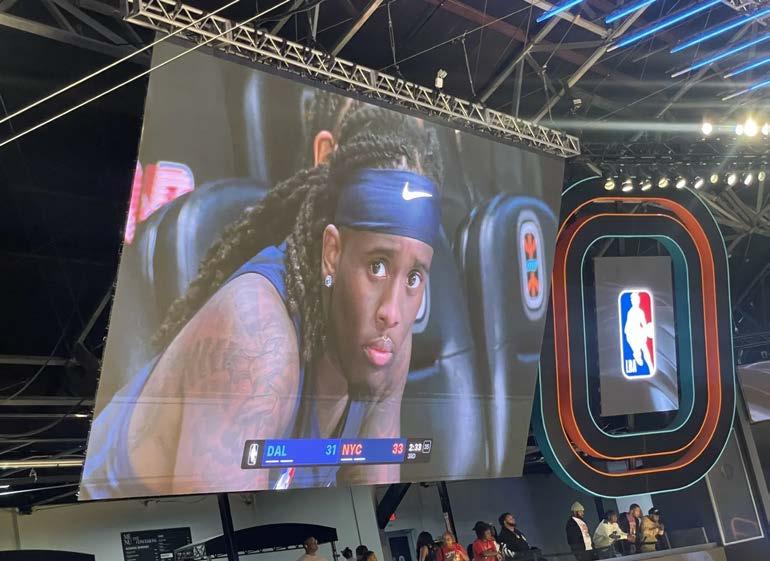
streamers like Tylil James sat courtside as they cheered on the New York Sky. At 22 and a couple of feet taller than his teammates and opponents, Cenat ironically stood out in a stark difference to the NBA’s average height of 6’6’’. But what they lacked in height, they made up for in determination.
The Dallas Giants, the opposing team, battled against the New York Sky, with the young boys going toe to toe against each other as they fought to get a win for the league’s first game. It was a time for the young players to shine, showing off their skills as they dribbled up and down the court, made plays, and scored shots. However, Cenat’s performance in the first half hints at why he was drafted last in his league. Dressed in a dark blue and orange New York Sky jersey, he only scored two points in the first half.
However, Cenat’s missed shots and multiple falls made it evident that his goal was to give the young basketball players an opportunity to showcase their skills and play in a semi-professional setting.
BY DONNELL SUGGS
The city of Morrow, which is located in Clayton County, has just over 6,500 residents. Clayton County, the sixth largest county in the state of Georgia, has just under 300,000 residents, according to United States Census data. There is currently no major bookseller in Clayton County after the Barnes & Noble location in Morrow closed on Tuesday, May 7.
The Morrow store, formerly store # 2865, was 23,000-square-feet and located on a two-acre lot, and had been in business for nearly 30 years. The closest major bookseller will be the Books-A-Million franchise on Jonesboro Rd. in McDonough, which is 15 miles away to the south or the Barnes & Noble location at Georgia Tech on 5th Street in Atlanta or on Peachtree Rd. in Buckhead.
The only bookstore in the county remains Nubian Books, a Black-

owned bookstore, which is located in Morrow and has been in business for 25 years. Nubian Books opened in February 1999 inside Southlake Mall and moved into its current location on Southlake Parkway in the fall of 2013.
A recent visit to the site of the former Barnes & Noble on Mt. Zion Rd. showed paper over the windows of the bookstore and of the former onsite Starbucks location, and no business in its place. Signage for business inquiries are posted on the site.
Barnes & Noble, the largest retail bookseller in the country, began being publicly traded on the New York Stock Exchange (NYSE: BKS) in 1993 before being sold to Elliott Management Corp. in 2019. The company employs 24,000 people and operates 50 locations across the country, according to Barnes & Noble website data.
There is no Barnes & Noble location in nearby Henry County as well.
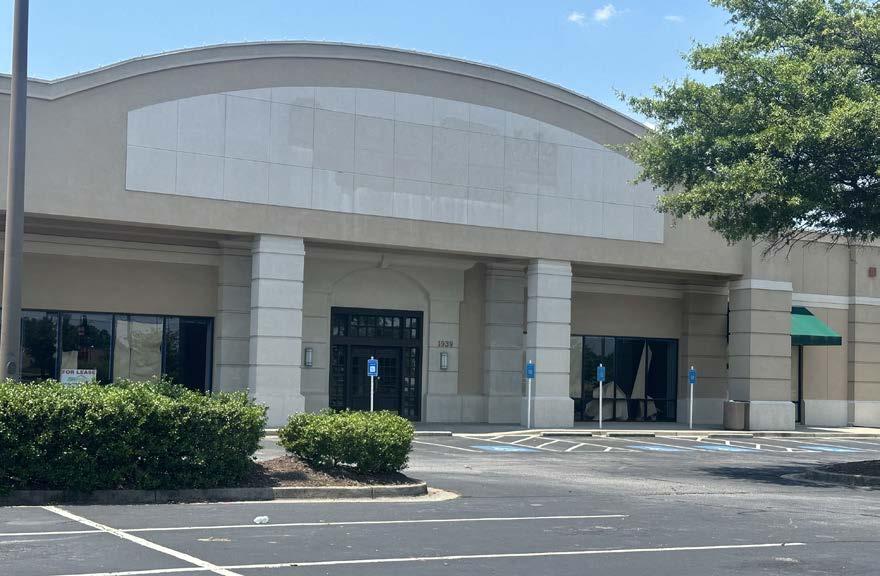


BY NOAH WASHINGTON
Born in Johannesburg, South Africa, Ralph Ziman, the South African artist behind The Casspir Project, uses his work to reflect on a lifetime shaped by the struggles of apartheid, militarization, and global cycles of violence. Unveiled at Atlanta Contemporary in a precursor to the Atlanta Art Week, the Casspir police vehicle, a 22-foot-long, 9-foot-tall installation that is a symbol for both oppression and transformation during apartheid, according to Ziman.
For the installation, Ziman transformed the tank with approximately 70 million handstrung glass beads. Taking three years to complete with the help of nearly 100 artisans.
Floyd Hall, the Executive Director of Atlanta Contemporary, shared insights on bringing Ziman’s Caspir project to the gallery during Atlanta Art Week. Hall explained that Atlanta Art Week has grown significantly and attracted attention from artists beyond the city. He discussed the opportunity to feature Ziman’s large-scale vehicle installation, which was first showcased at the Seattle Art Fair. Once the team realized they had the space to accommodate the exhibit in the outdoor plaza, Hall saw it as a "no-brainer" to host it.
“Our core mission is to provide free admission to world-class art, allowing a broad audience to engage with significant works like Ralph’s,” Hall said.
Ziman grew up during the darkest years of apartheid. He recalls a South Africa where Black people were systematically oppressed—denied basic rights such as owning land, using public transportation, and even attending cinemas.
"From an early age, I saw the people around me— treated as second-class citizens," Ziman explained. Despite being born into privilege as a white South African, he felt an innate sense of empathy and fairness. "You either have empathy or you don't," Ziman said. "It always amazes me that some people can’t see things from other people’s point of view."
By the time Ziman reached adolescence, South Africa was facing increasing unrest. He vividly remembers the 1976 Soweto Uprising, a pivotal moment in the anti-apartheid movement. "Our lives were so different. We went to school, while just miles away, kids were being killed for protesting," he recounted. During the uprising, Ziman’s school bus was escorted by police, while parents patrolled the school grounds with shotguns. From a hilltop at his school, Red Hill Elementary, Ziman could see the smoke rising from Alexandra Township as protests turned deadly. “Kids were throwing stones, and the police fired back with live rounds.”
After finishing school, Ziman worked as a cameraman for the South African Broadcasting Corporation (SABC), where he often found himself covering the violent uprisings and unrest. "I saw a lot of that firsthand," he said.

However, the most significant turning point in his life came when he was conscripted into the South African military. Faced with the prospect of donning the uniform of an oppressive regime, Ziman felt he couldn’t reconcile it with his values. “I couldn’t do it. I couldn’t put on that uniform. I kept thinking, what would I tell my children? I didn’t believe in the system, and I couldn’t be part of it.”
Ziman felt a stark line had been crossed when soldiers were tasked with controlling Black South Africans in the townships. He had signed all the necessary conscription papers and was on the verge of being called up when, days before his deployment, he made the life-altering decision to flee. He boarded a plane and left South Africa, knowing he would be branded a deserter. The military police came to his home looking for him, but by then, he was in another country. For years, he couldn't return home, as he risked imprisonment or forced conscription.
In exile, Ziman lived in London, though his situation there was far from easy. He was undocumented and, though he worked secretly directing music videos, he was constantly under threat of deportation. He eventually married, which allowed him to stay in the UK, but it took three years of bureaucratic wrangling to obtain any kind of formal residency.
His creative life in exile was influenced heavily by his formative years in South Africa, and by his deep appreciation for African art, music, and culture. Ziman cited his personal narrative, like those of many white South Africans who grew up under apartheid, as complex. He saw himself not as a European living in Africa but as someone deeply connected to the continent's African identity. Yet, the contradictions of being white in Africa—questions
of belonging, identity, and complicity—never entirely went away.
Eventually, as apartheid began to crumble in the late 1980s, Ziman was able to return to South Africa.The influence of apartheid, and its complex aftermath, never left Ziman. Even as the apartheid regime ended, the weapons it had produced, like the iconic Casspir armored vehicle, found new markets in other oppressive regimes around the world.
The Casspir Project is not only a commentary on the militarization of apartheid South Africa but also on the global spread of militarized policing. The Casspir, initially designed to suppress Black South Africans, found new life in the second Gulf War. The U.S. military purchased and rebranded the vehicle as the MRAP (Mine Resistant, Ambush Protected) to combat roadside bombs in Iraq and Afghanistan. “America liked them so much, they bought the patents and started making their own,” Ziman explained.
With The Casspir Project, Ziman sought to subvert the vehicle’s oppressive legacy. "The idea was to mess with it, to Africanize it, to upscale it," he said. The intricate beadwork covering the Casspir, created by artisans from multiple South African tribes in unity, serves as a stark contrast to the vehicle’s violent origins. Ziman’s goal was to create something modern and African, without referencing any specific tribe, as a celebration of the continent’s resilience and artistry.
The repurposing of military vehicles like the Casspir in American cities, including those in Georgia, during protests such as the George Floyd protests, highlights a stark reality: the methods of control and violence once used in apartheid-era South Africa are now being applied globally, often in the
name of law and order.
The connection between militarization and civil rights struggles is particularly poignant in Georgia, a state with a deep history of racial injustice and resistance. From the Civil Rights Movement of the 1960s to the Black Lives Matter protests that swept through Atlanta in recent years, Georgia has long been a battleground for the fight against systemic racism.
For Ziman, transforming the Casspir with vibrant, intricate beadwork represents an act of reclamation. "It’s about taking something brutal and oppressive and turning it into something beautiful, something that speaks to our shared humanity," he explained. Bringing this vehicle to Georgia, a state with its own fraught history of racial violence, adds another layer to this reclamation.
As Ziman’s work travels through different cities, he hopes it sparks conversations about the broader implications of militarization and the need for systemic change. Georgia, a state that played a critical role in the 2020 presidential election which saw Georgia transform into a key battleground state and Atlanta’s diverse communities leading the charge for change. Ziman’s installation is timed serendipitously with this upcoming political election.
"It's important to remember that while we’ve made progress, the fight for justice and equality isn’t over," Ziman said. "The past is never really behind us, and the systems that allowed apartheid to flourish still exist in different forms today.”
At its core, The Casspir Project is a call to action—a plea for vigilance and a reminder that the struggles for human rights and dignity are far from over, cited Ziman. “They say history doesn't repeat, it rhymes. And right now it's rhyming like crazy”.
BY ANN HILL BOND
An educated African-American was one of self-sacrifice during the era of enslavement and reconstruction. To be educated oftentimes meant to be a target in the southern region of the United States, Atlanta was not an exception. Before the opening of Booker T. Washington High school. Atlanta Public Schools didn’t accommodate its Black student population after the sixth grade.
Booker T. Washington High School in Atlanta opened its doors on Sept. 24, 1924, as part of the city's major school building program. But, not before years of conflict with the City of Atlanta and Atlanta Public Schools.
Public education in Atlanta began in 1872, but Booker T. Washington High was the city’s first public junior/high school for Black students, opening in 1924. Until then, Black students seeking a secondary education attended private institutions in the Atlanta University Center, which required tuition, making education inaccessible for many. The opening of the school was the result of decades of advocacy by Black community leaders, including a successful voter registration drive led by the NAACP in 1919. Their efforts resulted in a bond campaign that allocated $1.29 million for the construction of Black schools, with Booker T. Washington High School being one of the major outcomes.
The school was named for Booker T. Washington, an educator and leader born into slavery who founded Tuskegee Institute in Alabama. Washington was an advocate for Black self-sufficiency through education and vocational training, a philosophy that inspired the school's curriculum.
As Georgia’s first Black public high school, Booker T. Washington High School was more than just a place of learning; it became a cultural institution for the city's Black community.
Booker T. Washington High School is significant not just for its role in education but also for its architectural design. It was part of Atlanta's ambitious school construction program of the 1920s, each school distinguished by unique architectural styles. The medieval-style design of Booker T. Washington High gives it a cathedral-like presence in its neighborhood, reflecting its importance as a cultural institution.
Designed by Atlanta-born architect Eugene C. Wachendorff, the building is one of his most noted works. Wachendorff supervised subsequent additions to the school in 1948, which maintained his original design vision. His other projects include the Lamar County Courthouse and several hospitals.
The structure of Booker T. Washington High School is a striking example of medieval-eclectic architecture. The building, designed by Eu-
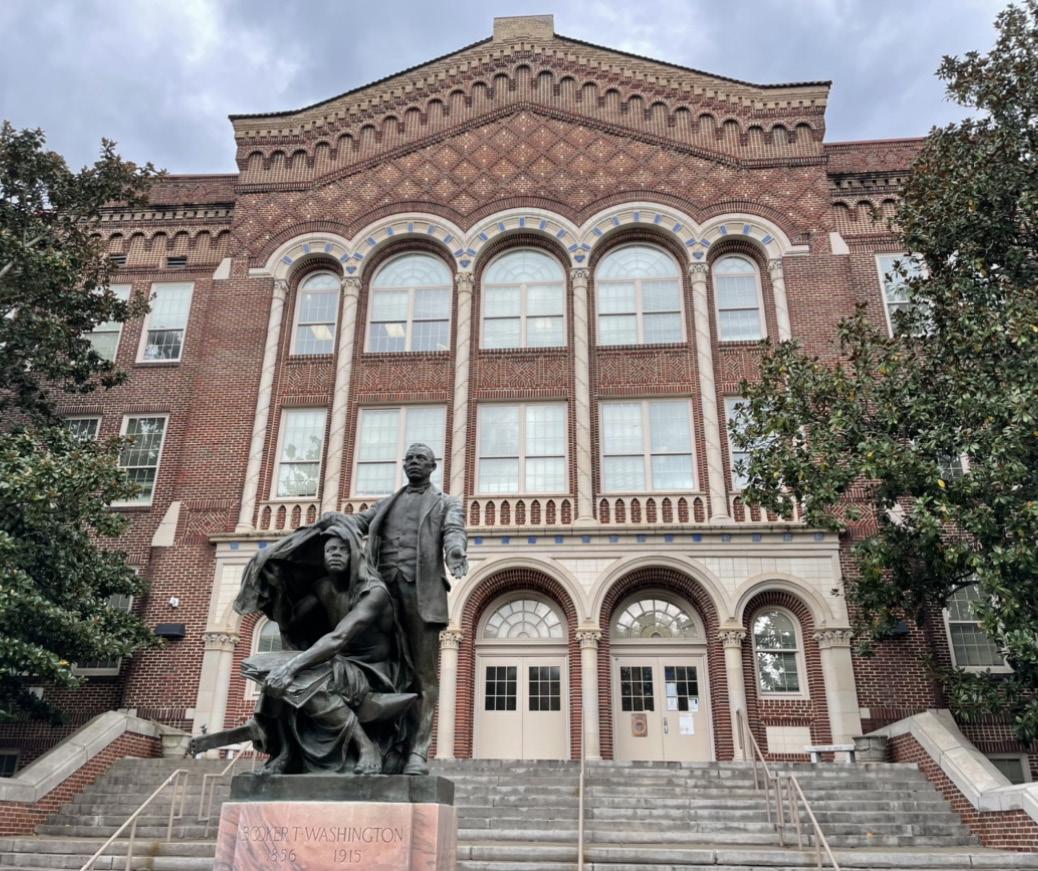
gene C. Wachendorff, is a four-story structure of reinforced concrete with brick veneer walls. It was completed in January 1924 at a cost of $325,300 and includes 40 classrooms, administrative suites, a library, cafeteria, and science laboratories. The elaborate main entrance, featuring five arches in two tiers, showcases terra cotta and Venetian-style columns, with brick corbeling used as a cornice across the front façade.
Erected in 1922, the school is a four-story structure built from reinforced concrete with brick veneer walls in a medieval-eclectic style. The school's front facade is a protected historical landmark by the National Register of Historic Places, where the school was listed in 1986. When renovations were done in 2005, modifications were made to the rear of the building, leaving the front untouched in compliance with historical preservation guidelines.
One of the most iconic features of the school is the statue of Booker T. Washington at its front entrance. The statue, designed by Charles Keck and added in 1927, depicts Washington lifting the veil of ignorance from the head of a former slave.
From its early years, Booker T. Washington High attracted students from across the U.S., including metro Atlanta and other regions of the Southeast. Enrollment ballooned to as many as 4,000 students. Families sought the school out due to its strong reputation for ac-
ademic excellence, paying $43 annually in tuition for their children to attend.
The school offered a standard high school curriculum alongside vocational training in areas such as automobile mechanics, tailoring, and brick masonry. Students were also taught skills like household management and child care, ensuring that both academic and practical knowledge were central to its mission.
The school's first principal, Charles L. Harper, played an instrumental role in shaping its success. Harper hired dedicated teachers who demanded excellence from their students, fostering a culture of high academic achievement. His leadership extended beyond academics, as he was involved in organizing educational tours, establishing student government, and leading efforts to improve the pay and working conditions for Black teachers across Georgia. Harper's impact on the school and the wider Atlanta community was profound. He served as president of the Georgia Teachers and Education Association and later as president of the Atlanta Chapter of the NAACP. His work extended beyond the walls of the school, as he became a tireless advocate for educational and civil rights.
Booker T. Washington High quickly established a reputation for academic excellence, drawing students not just from metropolitan Atlanta but from across the Southeast. In its early years, the school’s student population ballooned to as many as 4,000 students,
The influence of Booker T. Washington High School reached its peak during the Civil Rights Movement. The school played a crucial role in the fight for desegregation and equality, with many of its students and alumni participating in protests and marches. One of its most notable alumni is Dr. Martin Luther King Jr., who attended the school before enrolling at Morehouse College at age 15.
Booker T. Washington High became a meeting ground for young activists. Teachers and community leaders inspired students to join sit-ins, boycotts, and other civil rights activities across Atlanta. The school’s contributions to the movement cemented its place in history as a symbol of Black resilience and leadership.
For nearly a century, Booker T. Washington High School has produced numerous graduates who have gone on to leave significant marks on Atlanta and the nation. Prominent alumni include civil rights leader Dr. Martin Luther King Jr., Judge Romae T. Powell, Dr. Asa Yancy, and many others who became educators, doctors, and public figures.
The faculty at Booker T. Washington High has long been committed to nurturing academic excellence and social responsibility. Their dedication has allowed students to pursue successful careers and, in many cases, return to their communities to uplift future generations.
Today, Booker T. Washington High faces modern challenges common to many public schools. Socioeconomic disparities, underfunding, and shifts in educational standards continue to impact the school. Yet, its leadership and faculty remain dedicated to ensuring that students receive a quality education.
In recent years, the school has embraced new initiatives aimed at integrating technology into classrooms, expanding extracurricular activities, and building partnerships with local businesses and universities. These efforts are designed to ensure that Booker T. Washington High remains a vital institution, preparing students for success in a rapidly changing world.
As Booker T. Washington High School approaches its second century, it remains committed to the principles that have guided it since 1924. Education is still seen as the key to social advancement, just as it was during its founding years. The school continues to be a pillar of Atlanta’s Black community, with a legacy of leadership, resilience, and excellence that has shaped generations.

BY ISAIAH SINGLETON
With the aftermath of Hurricane Helene, many Georgians are still without power, suffering from flooding, and more.
Many eligible Georgia voters may have lost or damaged vital documents, including IDs and birth certificates, post-Hurricane Helene.
Helene, which reported to have impacted over 1 million people in the affected areas. With the election in just 35 days, those affected may face barriers to securing a new ID to vote in a tight timeline.
The election registration deadline is Oct. 7, and there's concern about the impact on voters. Post-Hurricane Helene, VoteRiders plans to set up recovery sites to help Georgians recover lost IDs.
Monica Spencer, Georgia organizer and faith coordinator, said although they want to help as effectively as possible right now, they haven’t been getting much response for help. She also said this is because communities who were affected by the hurricane may still be coping with the loss of lives, homes, and power.
“We haven't really gotten much response, because communities are still very numb with it and it has been traumatic for many of our communities,” she said. “IDs are the last thing a lot of people are thinking about when they're concerned about life and property. As you can imagine, when water, tornadoes, and floods come, it takes away everything.”
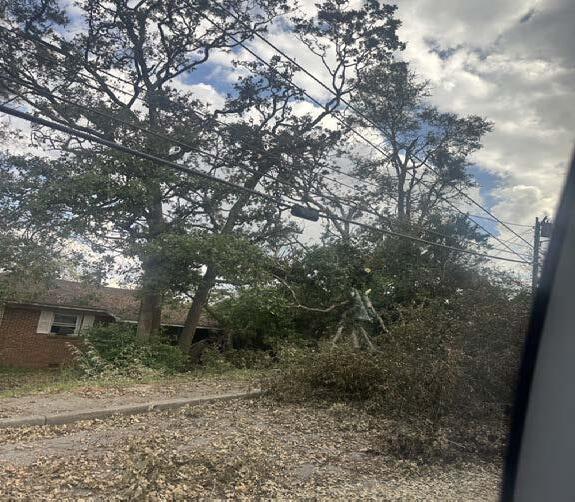
Spencer said VoteRiders will be stepping in while putting word out across the state and all other impacted areas that they’re here to help people recoup their identifications they’ve lost.
“Ideally, we would set up, much like Red Cross or Salvation Army, set up sites in harder impacted areas and do the work,” she said. “We can order a birth certificate on the spot, but other vital documents require people to answer security questions, and we can do that on the spot.”
She also says the situation is all relatively new but comes at a crucial time because of the election approaching. For some voters, she said, their vote might be in jeopardy because if they were born in a state that may take two or three months to process a birth certificate, it may result in them not being able to receive an ID in time.
“For a lot of voters, the election is no longer a priority and it's going to be difficult,” she said. “There are organizations who are reaching out to the governor and Secretary of State to see at the very least if they can extend the registration deadline to the counties most impacted.”
Additionally, VoteRiders encourages early voting due to potential polling place disruptions. They provide a helpline (866-432-8683) and offer virtual assistance. Despite the hurricane's impact, VoteRiders aims to support affected voters effectively.
Early voting begins Oct. 15 and Election Day is Nov. 2. For more information, visit http://voteriders.org/ and https://www.usa.gov/hurricane-helene.
BY DONNELL SUGGS
The Atlanta Falcons will be back in action on Sunday, Oct. 13 following a bye week. Atlanta will travel north to Charlotte to play the Panthers in an important NFC South matchup.
The Falcons are finally back on the road after having the luxury of hosting three consecutive games at Mercedes-Benz Stadium against the Kansas City Chiefs in week three, the New Orleans Saints the following week, and the Tampa Bay Buccaneers last Thursday night.
The NFC South, which has been won by the Tampa Bay Buccaneers the past two seasons, is going to be tight this year. The Falcons will have an opportunity to add to its division record during week eight in Tampa on Sunday, Oct. 27 and during week 10 in New Orleans on Sunday, Nov. 10.
Through the first four weeks of the season Atlanta (2-2) averaged 18 points per game.
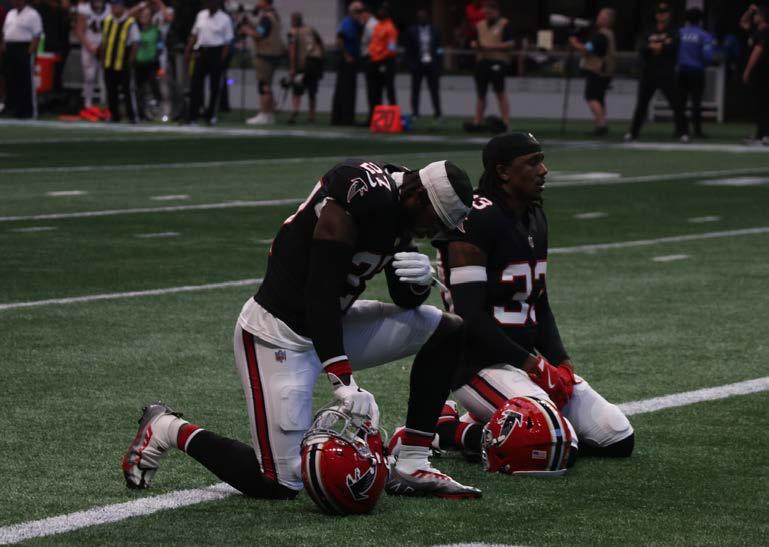
It’s going to take more than just over two touchdowns per game to win a division title. Following scoring a season-high during the 26-24 victory over New Orleans on Sunday, Sept. 29, Falcons quarterback Kirk Cousins acknowledge as much.
“We dug ourselves a hole starting 1-2,” Cousins said. “We know what’s out there for us and I expect there to be hard-fought games like they all have been thus far.”
The Falcons have missed the playoffs for six consecutive seasons and the last time Atlanta won a division title was in 2016, the year National Football League MVP Matt Ryan and his teammates made it all the way to the Super Bowl. Yes, that Super Bowl.
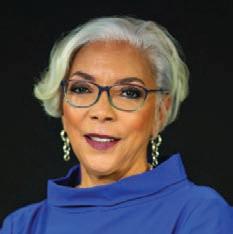
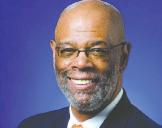
Sealed bids for 24ITBC1327565B-AA -
Duty Gear and Uniforms for the Fulton County Marshal Department, will be accepted by the Fulton County Department of Purchasing & Contract Compliance electronically through BidNet Direct at https:// www.bidnetdirect.com/georgia/fultoncounty, on Friday, October 25, 2024. All bids submitted must be received no later than 11:00 a.m. local (Eastern) time on the stated date.
Bids will be publicly opened and read at 11:05 a.m. on the stated due date via Zoom.
Join Zoom Meeting: https://zoom. us/j/95088264884?pwd=OLLFs4lRAzKsc8Ea5AUcZLCN7VXY9j.1 Passcode: 067406
Or One tap mobile: +14702509358,,95088264884#,,,,*06740
6# US (Atlanta) +14703812552,,95088264884#,,,,*06740
6# US (Atlanta)
Bid Bond: N/A
Scope of Work: Fulton County, Georgia (“County) The selected firm will provide Duty Gear and Uniforms for the Fulton County Marshal’s Department as outlined in the solicitation #24ITBC1327565B-AA.
In order to obtain complete information about this solicitation, please click the link below where this document and supporting documents can be downloaded, https:// www.bidnetdirect.com/georgia/fultoncounty.
Fee: N/A
Term of Contract: This is an annual agreement with two (2) one (1) year renewal options.
Pre-Bid Conference: N/A
If you have any questions regarding this project, please contact Alma Alphonse, Assistant Purchasing Agent, at Email: alma.alphonse@fultoncountyga.gov or 404-612-7965.
Fulton County reserves the right to accept or reject any or all bids and to waive technicalities









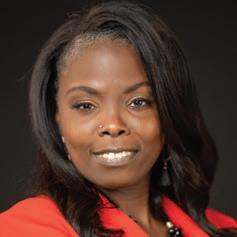

















these 10 HBCU students drive the summer internship of a lifetime with Black-owned newspapers








